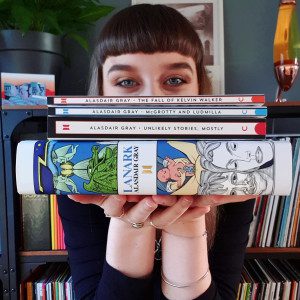11 Books for the Smart Justice Generation

To celebrate the launch of the #SmartJusticeGeneration hub, we’ve teamed up with brilliant book blogger Rebecca Brown AKA That Bloody Woman Reads to curate this (mostly Scottish!) list of suggested reading for those interested in social justice.
The list is deliberately varied; a mixture of fiction, non-fiction, essays, short stories and poetry. Follow Rebecca on Instagram for more brilliant book reviews and suggestions. Happy reading!
Community Justice Scotland is on a mission to make useful resources accessible to anyone who needs them. The #SmartJusticeGeneration hub is a one-stop shop for anyone with an interest in social justice.

1. Happiness is Wasted on Me by Kirkland Ciccone
‘This is a novel about where and how we live and the ways in which we choose and refuse to tell the stories that shape us. Ciccone’s writing asks big questions about whether we can freely create the lives we choose to live. This is a novel that peeks its head around many closed doors but is ultimately a celebration of greater Glasgow and its ugly parts — poverty, violence, dark humour and complicated domestic lives.’
2. On Connection by Kae Tempest
‘Tempest examines the duality of who we actually are and who we would like to be through the ways in which we cope with the moveable parameters of our lives. This is a book about becoming a better reader of and listener to other people in the hope that human connection can happen anywhere. Tempest proves that what connects us is invariably more powerful than what divides.’
3. Slug by Hollie McNish
‘This is a book of multiple forms — a mixture of prose, poetry, short stories and essays — that covers topics such as contemporary motherhood, lockdown, grief, sex and, ultimately, being human. McNish writes about the trails we leave behind and the choices we make as we move forward in a way that will make many of us feel seen. Highly recommended — and it’s filthy drop dead gorgeous.’

4. Mayflies by Andrew O’Hagan
‘This is a novel about the daft and romantic vitality of youth, following a band of bottle-sharing brothers as they take their own particular measures against the struggle to live a complete life. O’Hagan explores dreams of newness, of mourning and memory and the wish to separate from home, from which identity is almost always inextricably linked. A journey to the interior of male fragility, O’Hagan proves that difficult things do not cancel out other difficult things as we get older. The most moving novel I’ve read in a long time.’

5. Duck Feet by Ely Percy
‘This is an episodic novel about growing up in the mid-naughties in Glasgow. Brimming with the pressure of social expectation, Percy offers an important portrayal of the richness of working class lives in fiction told through teenage eyes. Percy’s writing gives the gravity and the silliness of adolescence equal weight as their characters struggle to navigate and invariably lack the agency to resist the influences that govern their lives — the internet, drugs, poverty, body image, peer pressure, grief.’

6. Shuggie Bain by Douglas Stuart
‘This is a novel all about 1980s Glasgow; its furloughed dreams and deep rooted prejudices; about love that’s tested and love that’s conflicted – gone wrong, denied or misunderstood. Stuart offers unapologetic vignettes of compassion, bravery and horrific roaring violence from Glasgow’s insulated and isolating housing schemes as his characters struggle to survive within and invariably lack the agency to fight against the structures of oppression that contain them. Despite the specificity of time and place, this is ultimately a universal story of the resilience of the human spirit and putting on a brave face for the world.’

7. Scabby Queen by Kirstin Innes
‘This is a novel about private lives colliding with public image. Like its unapologetically outspoken protagonist, this book does not shy away from big themes – of activism, protest, solidarity, feminism and working class politics – and what they mean in a world of increasingly information-fed madness.’

8. Don’t Touch My Hair by Emma Dabiri
‘I was completely fascinated by this book where hair becomes the living embodiment of a complex visual language. Part social history, part memoir, Dabiri shows that the scope of its concerns are also gendered, technological, philosophical and spiritual. Far from being “only” hair, this book proves that the very serious business of black hairstyling culture can be understood as an allegory for black oppression and, ultimately, liberation. Essential reading for everyone.’

9. Surge by Jay Bernard
‘This is a debut poetry collection that powerfully resonates in our current moment. Bernard brings together public narrative and private inner worlds to create an original exploration of contemporary black British experience. Functioning as a mirror of the present but with an unbearable sense of history repeating, I had to stop reading these (sometimes) difficult poems on multiple occasions.’

10. Let Me Tell You This by Nadine Aisha Jassat
‘This is a stunning poetry debut from one of my favourite Edinburgh-based poets. I heard Nadine tell some of these poems at an event last year and was amazed by the way she doesn’t hold back from questions about racism, dual heritage and gender-based violence.’

11. Hings by Chris McQueer
‘Hilariously uplifting, vibrant and surreal stories about working class Glasgow – this one felt like home. McQueer brings some dangerously relatable stories about Glasgow, my favourite Scottish city.’


